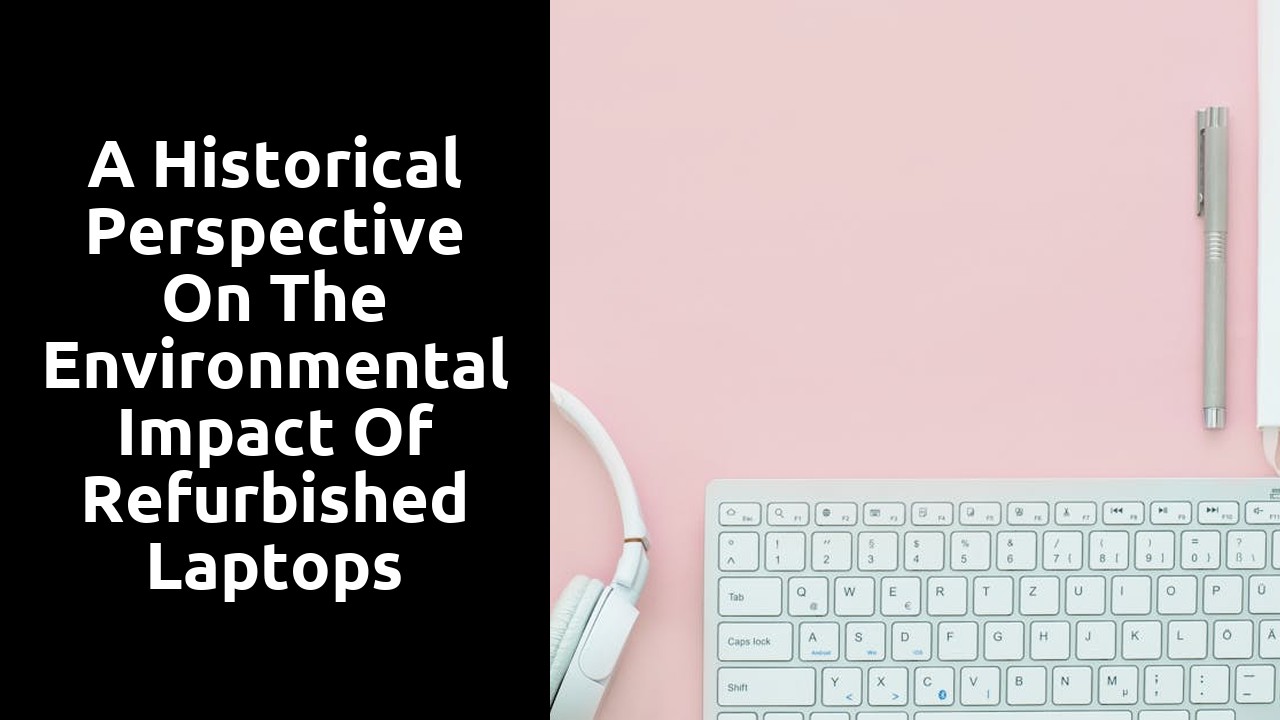
A Historical Perspective on the Environmental Impact of Refurbished Laptops
Technological Innovations in EWaste Recycling
Technological innovations have played a pivotal role in revolutionizing e-waste recycling practices, particularly in the realm of refurbishing laptops. The advent of sophisticated machinery and advanced processes has significantly enhanced the efficiency and effectiveness of recycling electronic components. As a result, the environmental impact of discarded laptops has been mitigated, paving the way for a more sustainable approach towards electronic waste management.
In recent years, the integration of artificial intelligence and automation in e-waste recycling has heralded a new era of eco-friendly practices. These cutting-edge technologies enable precise sorting of materials and streamline the refurbishment process, ensuring that valuable resources are salvaged and reused. Moreover, the adoption of innovative techniques like chemical recycling and modular design has further bolstered the sustainability of laptop refurbishment, marking a positive shift towards a greener and more responsible electronic industry.
Advancements in Recycling Processes for Laptop Components
Advancements in recycling processes for laptop components have played a crucial role in minimising the environmental impact of electronic waste. With rapid technological advancements, recycling methods have become more efficient and effective in recovering valuable materials from discarded laptops. These processes involve intricate disassembly techniques to separate reusable components such as circuit boards, batteries, and screens, which are then recycled into new products.
The development of innovative recycling technologies has also led to a reduction in the amount of e-waste ending up in landfills. By incorporating methods like mechanical shredding, thermal processing, and chemical treatment, recyclers can extract valuable metals like gold, silver, and copper from laptops, thus conserving natural resources and reducing the need for mining. Additionally, the emphasis on closed-loop recycling systems ensures that materials are continuously reused, promoting a more sustainable approach to managing electronic waste.
Corporate Responsibility and Sustainability
Corporate responsibility and sustainability have become increasingly critical in today's business landscape. As consumers and stakeholders demand more transparency and accountability, tech companies are under pressure to demonstrate their commitment to environmental conservation. The push for sustainable practices has led many companies to reassess their operations and supply chains, seeking ways to minimise their ecological footprint and promote a circular economy.
In response to growing concerns about e-waste and pollution, some tech giants have taken proactive steps towards sustainability. Initiatives such as designing products with recyclable materials, implementing take-back programs for old devices, and investing in renewable energy sources showcase a shift towards more responsible practices. By incorporating sustainability into their core business strategies, these companies are not only mitigating their environmental impact but also setting a positive example for the industry as a whole.
Initiatives by Tech Companies to Reduce Environmental Impact
Tech companies have increasingly recognized the importance of reducing their environmental impact in recent years. One approach taken by these companies is to implement sustainable practices throughout the entire lifecycle of their products. This includes using eco-friendly materials in the manufacturing process, reducing energy consumption during production, and designing products with recyclability in mind.
Furthermore, tech companies are investing in research and development to create more energy-efficient devices. By focusing on energy efficiency, they aim to reduce the overall carbon footprint of their products and help consumers lower their energy usage. Alongside these efforts, companies are also exploring ways to extend the lifespan of their products through repair programs and upgrades, ultimately contributing to a more sustainable approach to technology consumption.
Consumer Behaviour and Environmental Awareness
Consumer behaviour plays a crucial role in shaping the environmental impact of refurbished laptops. In recent years, there has been a noticeable shift towards eco-friendly purchasing decisions among consumers. Increasing awareness about the detrimental effects of e-waste on the environment has prompted individuals to consider the environmental footprint of their electronics, including laptops. This shift in consumer mindset has pushed companies to be more transparent about their refurbishing and recycling processes, leading to a demand for more sustainable practices in the tech industry.
As consumers become more environmentally conscious, they are also showing a preference for products that align with their values. This has created a market demand for refurbished laptops that are not only cost-effective but also eco-friendly. Companies that provide refurbished laptops are increasingly focusing on highlighting the sustainability aspects of their products, appealing to a growing segment of environmentally aware consumers. By making informed purchasing decisions and choosing refurbished laptops over new ones, individuals can contribute to reducing e-waste and lessening the environmental impact of electronic devices on our planet.
Shift towards EcoFriendly Purchasing Decisions
With the escalating concerns surrounding environmental degradation, consumers are increasingly gravitating towards eco-friendly purchasing decisions. This shift signifies a growing consciousness among buyers regarding the need to opt for refurbished laptops that have a reduced carbon footprint. Consumers are now displaying a preference for products that align with sustainable practices and demonstrate a commitment to environmental protection.
The surge in eco-friendly purchasing decisions is not merely a passing trend but a fundamental change in consumer behaviour. People are acknowledging the importance of making environmentally conscious choices, not only for the present but for the future as well. This transition towards sustainable purchasing habits is a positive step towards mitigating the adverse impacts of electronic waste on the environment, reflecting a collective effort towards fostering a greener and more sustainable society.
Related Links
The Roundup: Environmentally Friendly Refurbished Laptops A Greener OptionWhy Choosing Refurbished Laptops Supports Environmental Conservation
5 Environmentally Friendly Refurbished Laptops You Should Consider
Review: Environmentally Friendly Refurbished Laptops A Sustainable Choice